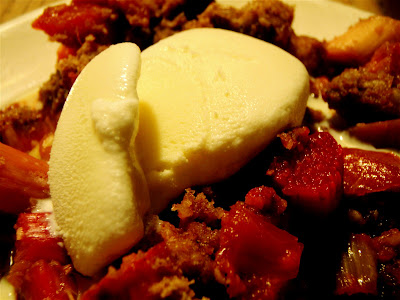
I thumb my nose at organics, and this is why.
Having grown up on a little organic farm, I consider organically grown food a baseline for human civilization. Planting things for later harvest helped to define human civilization many thousands of years ago, and organic agriculture was the foundation of nearly every culture from then 'til the modern, chemically enriched post-WWII age.
Having until recently been a cornerstone of society, organics are practically an inalienable right. Industrial Food went ahead and alienated it all the same. Today, "organic" food is a far cry from what you grow in a garden, and largely the privilege of the affluent and educated.
Today's corruption of organic food was brought to you by the USDA. What have you done for the USDA lately? Well, industry lobbyists have done more. That's why there's a list of unnatural substances that are allowed in USDA approved organics. To shed a little light on how the process works, here is the tale of Methionine, which gives your chicken that special "something".
The Summary of FR DOC E8-15390: This proposed rule would amend the U.S. Department of Agriculture's (USDA) National List of Allowed and Prohibited Substances (National List) to reflect one recommendation submitted to the Secretary of Agriculture (Secretary) by the National Organic Standards Board (NOSB) on May 22, 2008. Consistent with the recommendation from the NOSB, this proposed rule would revise the annotation of one substance on the National List, Methionine, to extend its use in organic poultry production until October 1, 2010.
Methionine was petitioned for its continued use as a synthetic feed additive in organic poultry operations. Methionine is a colorless or white crystalline powder that is soluble in water. It is classified as an amino acid and considered to be an essential amino acid that is regulated as an animal feed nutritional supplement by the Food and Drug Administration (21 CFR 582.5475).
Methionine was originally included on the National List on October 31, 2003, with an early expiration date of October 21, 2005...Methionine was petitioned by organic livestock producers as a part of the NOSB's 1995 initial review of synthetic amino acids considered for use in organic livestock production. The petitioners asserted that Methionine was a necessary dietary supplement for organic poultry, due to an inadequate supply of organic feeds containing sufficient concentrations of naturally-occurring Methionine...The petitioners also asserted that a prohibition on the use of synthetic Methionine would contribute to nutritional deficiencies in organic poultry thereby jeopardizing the animal's health.
To sum up: giving chickens organic feed that does not include methionine would be bad for them. Well, shucks! Lucky for chickens that we're here to keep 'em healthy; they must have been suffering for centuries. This petition's purpose was just to give the industry time to find a replacement for methionine:
The NOSB recommended an early expiration on the use of Methionine to encourage the organic poultry industry to phase out the use of synthetic Methionine in poultry diets and developnon-synthetic alternatives to its use as a feed additive.
That must have been a real stumper! Because after the initial two year period, poultry farmers (just two, in fact) requested and received a three-year extension to keep working on it. That was three years ago; now they're asking for another two years. The scientists who genetically engineered rice are apparently still scratching their heads over nutritional chicken feed. Ha ha, no, that would be silly! Of course there's a suitable organic feed. Here's what the National Organic Standards Board has to say about it:
The NOSB has determined that while wholly natural substitute products exist, they are not presently available in sufficient supplies to meet poultry producers needs...Loss of the use of Methionine, at this time, would disrupt the well-established organic poultry market and cause substantial economic harm to organic poultry operations.
Good point. The "organic" poultry industry is well-established; why, it's been using methionine for five years. We can't just expect them to stop because they said they would.
The "not available in sufficient supplies" is the real kicker, and it was used to justify a number of additions to the substance List about a year ago. In other words, We (the poultry factories) want to put the organic label on our chickens. But the large scale and low standards that define our business prevent us from complying with organic requirements. We need you to change the standards so that we can play the organic money-making game.
And change they did.
Organic food? Yes, by all means, get it from a farmer you trust. USDA-certified organic chicken nuggets? Nuggets is nuggets.
Read the scandalous (if somewhat dry) tale of methionine at http://edocket.access.gpo.gov/2008/E8-15390.htm







































